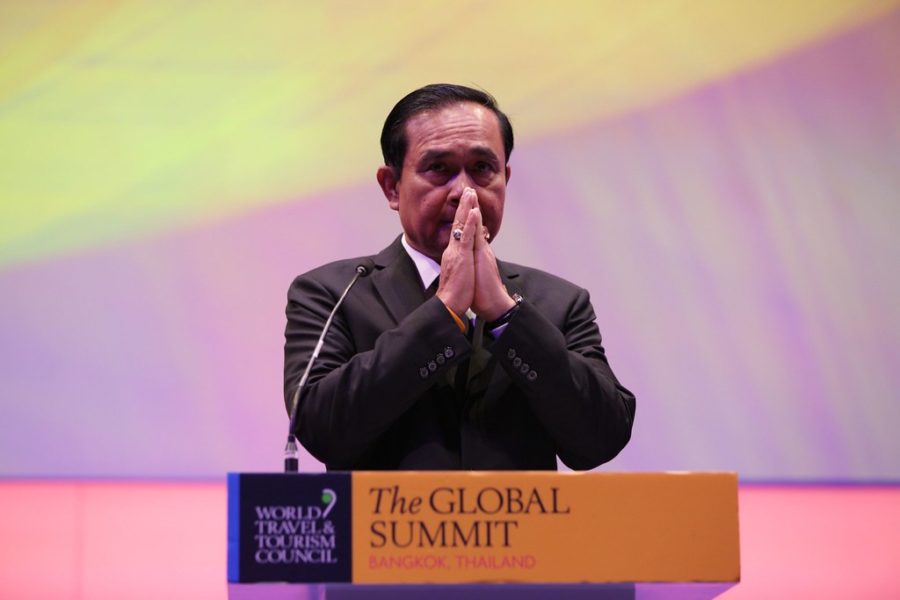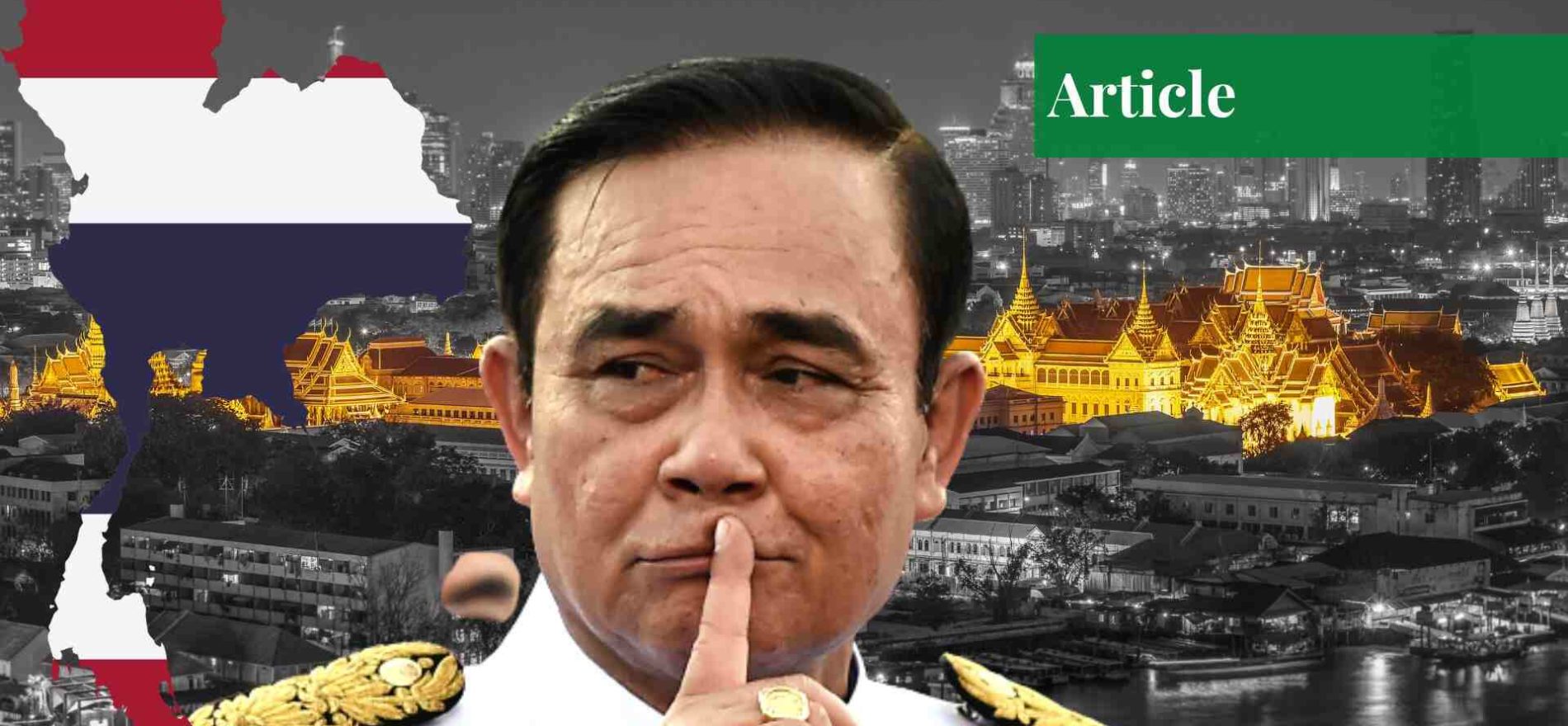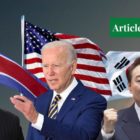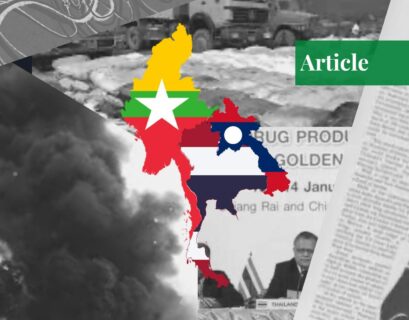Ms Abrish Nayyar is a student of BS Mass Communications at the National University of Sciences and Technology (NUST). Her subjects of interest are the history of the subcontinent, sociology, and mass media.
Reviewing Term Limit
On 17th August, the opposition parties filed a petition with the Constitutional Court asking for a decision on the constitutionality of Thai PM Prayut Chan-o-cha’s premiership. Opposition parties are worried that General Prayut’s tenure may go beyond the eight-year limit for the position set forth in Section 158 of the 2017 constitution.
Since the suspension came out of the blue, it has sparked rumours that the royal establishment of Thailand is attempting to replace Prayut Chan-o-cha ahead of time, considering that elections are due to be held in March 2023 regardless. Despite the fact that the military-backed alliance is still expected to win elections, it faces fierce opposition from Thaksin’s Pheu Thai party, whose supporters have consistently won the most seats in national elections over the past two decades.
Surviving a No-confidence Vote
In July, Thai PM Prayut Chan-o-cha survived his fourth no-confidence vote in the legislature, which was expected to be his final significant political test before elections the following year. During a vote in parliament on the 23rd of July, the former army leader won 256 votes in favour, 206 votes against him, and 9 abstentions.

The vote came after four days of televised hearings in which the 68-year-old leader was interrogated by opposition members. The vote should have been sufficient to ensure that Prayut would continue to hold the office of prime minister until his term expired in March 2023.
Prayuth has countered the criticism levelled at him by claiming that his administration successfully managed the economy after the outbreak, enabling it to now reopen and begin bringing in crucial tourist dollars. However, little hope is seen for those who may have been wishing for freedom from what is often described as the military domination of politics.
Prayut or Prawit?
According to Reuters, the acting leader, Prawit Wongsuwan, is not much of an improvement from Chan-o-cha. Wongsuwan served as the deputy Prime Minister since 2019 and has been a longtime ally of Prayut Chan-o-cha. Additionally, both Prawit and Prayuth served in the exclusive Queen’s Guard unit closely affiliated with the palace; both men are former army chiefs who are renowned for their intense commitment to the queen.
The only difference, perhaps, is that Prawit Wongsuwan has a tendency to exercise influence behind the scenes, unlike Prayuth. The former has long been seen as a power broker among the wealthy elite who support Thailand’s royal family and the military, as well as inside the Palang Pracharat party, which he co-founded.
Next for Thai Politics?
According to experts who are keeping an eye on these events as they unfold, there are four possible routes.
Prayut Returns
This depends on when exactly, as per the court decision, Prayut’s term began. He can still serve another full four-year term if the court rules that his tenure as prime minister of a civilian government began in June 2019. Basically, he can continue serving as prime minister immediately and finish out his four-year term in March if the court rules in his favour.
However, the choice will still impact whether he continues to be the preferred candidate for the ruling party in the upcoming election. Also, it increases the chances that the ruling party will oust him before the next election.
Prayut Forced to Leave
If Prayut loses, he will be removed from office immediately and no political party will be able to put him forward as a candidate for prime minister in the subsequent election. Additionally, the government would have to vacate its position and act as caretakers until the parliament chooses a new leader.
Legal experts are in disagreement over whether Prayut may continue serving as a caretaker, claiming that the constitution is ambiguous in this regard. In this case, a greater concern would be for the military, who would have to choose a new replacement from the list of candidates that were approved before the 2019 elections. As luck may have it, Prayut was the only one who had a favourable outlook on the military.
Prayut Resigns
As unlikely as the scenario may be, Thai PM Prayut may still resign, and Wongsuwan would probably continue to head the interim government. This possibility is not paid much heed, as people believe that if Prayut was ever going to resign, he already would have done so, considering the steep decline in his popularity.
It would also have been a more graceful exit, as opposed to a resignation tendered while the individual is suspended.
Decision Postponed
Since there is no deadline for the Constitutional Judge to determine a ruling, it is possible that it will continue deliberations through the end of the current government’s term in March of the following year. In reality, this runs the risk of inciting protests and escalating voter resentment.
Additionally, it would raise the possibility of the ruling party choosing a different candidate to put an end to the ambiguity regarding Thai PM Prayut’s standing before the upcoming election. Given that his suspension was probably intended to calm the political fervour in Thailand, analysts have argued it wouldn’t make sense to postpone the decision for more than two months.
The Kingdom’s Fate
It is important to note, however, that the only consequences for Thailand would not be limited to its Prime Minister’s office. Given that Thailand is scheduled to welcome world leaders at a summit of the Asia-Pacific Economic Cooperation economies in November, this scenario might have a negative effect on the country’s reputation internationally. The suspension, according to Thai Foreign Minister Don Pramudwinai, won’t have an impact on Thailand’s plans for the occasion.
Furthermore, the ruling party is increasingly disliked, and this court ruling may serve to hasten the process. According to polls, Prayut is incredibly unpopular and the Thai economy is expected to grow at the slowest rate in Southeast Asia this year. According to a June poll, Paetongtarn Shinawatra of Pheu Thai, who is Thaksin’s daughter, was far ahead of Prayut in terms of acclaim.
Regardless, with elections only a few months away, there are a great number of issues to be tackled. One of these is the fact that electoral reform bills have not yet been finalised and adopted by parliament, so the methodology used to calculate the results of that survey has been called into question. A constitutional crisis can result from the current circumstance.
A top cabinet official raised concerns on Thursday regarding the decision in parliament on July 6 to alter the method for allocating party list seats in the upcoming general election. Somsak Thepsutin, Minister of Justice, stated that the only options may be to abandon the electoral reform process altogether or go back to the original proposal that was agreed upon prior to the surprise result.
The concerns of the Federation of Thai Industries (FTI) regarding corporate confidence are no less important. If Thai PM Prayut is removed from office, it may affect the steps that were underway to aid the economy. However, if he is allowed to continue his term, it may lead to protests across the nation, resulting in a setback for businesses.
If you want to submit your articles and/or research papers, please check the Submissions page.
The views and opinions expressed in this article/paper are the author’s own and do not necessarily reflect the editorial position of Paradigm Shift.















